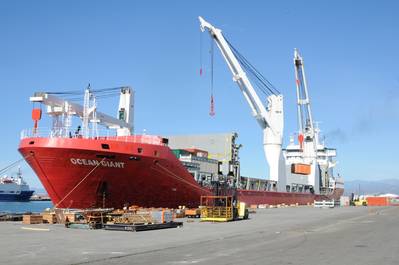MSC Supports Operation Deep Freeze
MSC ships underway in support of annual Operation Deep Freeze Antarctica resupply mission.
Military Sealift Command-chartered container ship MV Ocean Giant departed Port Hueneme, Calif., loaded with nearly seven million pounds of supplies such as frozen and dry food stores, building supplies, vehicles and electronic equipment and parts, Jan. 17.
MSC-chartered tanker ship MT Maersk Peary departed the European area of operations in December, with over six million gallons of diesel fuel, jet fuel and gasoline. Both ships are currently underway en route to McMurdo Station, Antarctica, marking the start of MSC’s resupply efforts in support of Operation Deep Freeze, the annual Joint Task Force Support for Antarctica mission to resupply the remote scientific outpost.
During this single mission, MSC-chartered ships will deliver 100 percent of the fuel and about 80 percent of the supplies that researchers and support personnel in Antarctica need to survive and work over the course of a year. Maersk Peary will arrive in Antarctica first and discharge its fuel cargo, followed by Ocean Giant in mid-February. Ocean Giant is scheduled to off-load its cargo at a 500-foot ice pier that juts out from the Antarctic coast. The cargo will be off-loaded by members of Navy Cargo Handling Battalion One working around-the-clock for eight days. Following the off-load, the ship will be loaded with retrograde cargo for transportation off the continent, including ice core samples carried back to the United States in sub-zero freezer containers, as well as trash and recyclable materials for disposal and equipment no longer required on station.
In 2012, unfavorable weather conditions made the ice pier at McMurdo unusable for dry cargo operations. Members of the Army’s 331st Transportation Company constructed a floating dock to ensure cargo operations could be conducted. “Even though we’ve been conducting ODF missions for many years, every year we have challenges to face,” said Tom Brown, MSC Pacific Sealift Prepositioning and Special Mission Team Lead.
“We try to address as much as possible in the planning phase, but because we are working with Mother Nature, we can’t always know what will happen. Because of this, we really have to function as a team, not just within the Navy, but with all the other organizations who participate in this mission, to ensure that we get the critical cargo onto the ice, and on time, to support the people who live and work there,” he said.
Due to adverse winter conditions in Antarctica, the ODF mission must take place during a small window of opportunity in the Antarctic summer months of January to March. This can mean tight schedules for everyone involved in the mission, from the ship’s crew, to the cargo handlers on the ice, to the mission schedulers in the United States.
“Operation Deep Freeze is a very critical mission for the people who live and work in Antarctica,” said Capt. Sylvester Moore, commander MSC Pacific. “Without this resupply mission, all operations in Antarctica would end, and the scientific community would lose the opportunity to conduct research and study not only the continent of Antarctica, but its impact on our global climate.”
An MSC-chartered cargo ship and tanker have made the challenging voyage to Antarctica, which includes passage through a 15-mile ice channel, in places more than 13 feet thick, every year since the station was established in 1955. MSC operates approximately 110 non-combatant, civilian-crewed ships that replenish U.S. Navy ships, conduct specialized missions, strategically preposition combat cargo at sea around the world and move military cargo and supplies used by deployed U.S. forces and coalition partners.











